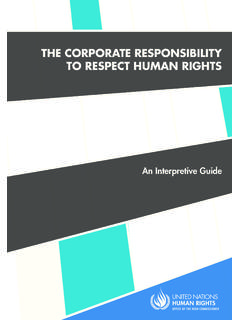Transcription of The dark side of arbitration and Conciliation in Zimbabwe
1 Journal of human Resources Management and Labor Studies December 2015, Vol. 3, No. 2, pp. 65-76 ISSN: 2333-6390(Print), 2333-6404(Online) Copyright The Author(s). 2015. All Rights Reserved. Published by American Research Institute for Policy Development DOI: URL: The dark side of arbitration and Conciliation in Zimbabwe Mildred Mahapa1 & Watadza Christopher2 Abstract Disputes and conflicts are the most prominent characteristics of human existence since time immemorial. It is this inevitability of disputes that calls for measures to be put in place so as to effectively and efficiently resolve them in order to manage the employment relationship. arbitration and Conciliation are two ways that are most used in organization to solve these conflicts. Their use has brought both positive and negative results in different organization. The paper however sought to look at the challenges of the arbitration and Conciliation process from the Zimbabwean perspective.
2 Different sources were used to present the critical analysis of these challenges Keywords: arbitration , Conciliation , labour, management and government 1. Introduction History is sated with records of conflicts at various levels of human relations whether at inter-personal, inter-group, intra-group and intra-national or international arenas, conflicts have been found recurring in social relations. It then follows thatconflict is also an inevitable characteristic and perspective in employment relations. This is motivated and precipitated by the dichotomy in interests and goals between parties in an employment relationship, that is, labour and capital. This study was prompted by the inevitability of these class disputes, which was further polarised by the advent of Industrialisation, and the need for the state to design dispute resolution mechanisms in place that are effective and efficient to enable an environment that breeds productivity and enable business.
3 1 Mildred Mahapa-Lecturer in the Department of human Resource Management, Midlands State University 9055 Gweru Zimbabwe . Email: :00263779297472 2 Christopher Watadza-HR Officer Zim Alloys Gweru, Zimbabwe . Email: Cell: 00263772 698 036 66 Journal of human Resources Management and Labor Studies, Vol. 3(2), December 2015 2. Background of the study The Zimbabwean Courts have been characterised by back logs in labour cases taking more than 5 years to resolve and finalise and a result an alternative to the court system has been established in order to counter the challenges associated with the court litigation route. The Zimbabwean legal structure is critical and of paramount importance as it provides the provisions within which the Conciliation and arbitration derives its legal is of paramount importance to note at this stage that Conciliation and arbitration are employed as alternative dispute resolution mechanism to the traditionally used cumbersome litigation process.
4 The litigation process is usually long and cumbersome and the parties have little or no influence to the process in terms of speed. Muza (2009) highlighted that the undependability of the courts traceable to numerous shortcoming dogging them is the reason why arbitration and Conciliation should be opted for. Even Mazanhi (2010) substantiated the above position where he noted that the Zimbabwean labour Court has been profound of delays in attending to cases due to the long queues of cases waiting to be heard. It is against this background that arbitration and Conciliation has been the most preferred mechanisms for dispute resolution. However despite it being a preferred mechanism, there are some challenges enshrined in it. It is against this background that the writers sought to highlight some of the challenges.
5 3. Challenges of arbitration and Conciliation Costs In case of a no settlement at Conciliation , the Conciliator initiates a certificate of no settlement and forwards the case for arbitration . If one party chooses a private Arbitrator, there are costs involved. The costs of arbitration according to the Labour Act Section 98 (7) are such that the Labour Officer or Designated agent for the employment council which is registered to represent the enterprise or industry from which the parties are from, will determine the share of arbitration costs to be borne by each party (Gwisai, 2007). The trend is that many parties choose Arbitrators by Labour Officers withstanding the back log that is building up in this regard. Mahapa & Christopher 67 Unfortunately, this has created the avenue for employers to plead incapacity to pay the costs of arbitration and opting arbitration by Labour Officers with the hidden agenda of subjecting the dispute resolution to delays which are inevitable with this route (Duve, 2011).
6 The government have through the arbitration Act (Chapter 7:15), gazetted Arbitral fees with US$300 as a minimum which normally involves one person against the company. As alluded above the Conciliator will determine the share of arbitral costs. However Mariwo (2008) observed that in cases which involves unfair dismissal , the arbitral costs are usually excessive to the appellant who is actually out of employment and seeking reinstatement through this mechanism. He added that the majority end up giving up on the process or opting for the Government Arbitrator where cases takes more than 36 months to be settled. Maitireyi and Dube (2013) noted that the pricing of arbitral costs unfairly favors employers who have a better financial footing than employees. This may create an unenviable situation where unscrupulous employers abuse their financial advantage by frequently and deliberately declaring disputes in order to squeeze employees financially.
7 It is important to highlight that there has been a practice nowadays in Zimbabwe which has been designed in order to reduce arbitral costs and enhance accessibility and consequently effectiveness of the alternate dispute resolution mechanism. The practice according to Madhuku (2010) has developed in Harare as part of what is described as social responsibility . As part of social responsibility, an independent arbitrator is asked to do at least two cases for free, without charging the parties any fees. This has been designed in response to the increasing number of parties who plead incapacity to meet the costs and thereby resulting in backlog of cases awaiting arbitration by government Labour Officers. However in the absence of a legal basis to push and sustain such a position or gesture, some Arbitrators refuse to take social responsibility cases.
8 This explains why the issue of social responsibility cases has been peculiar to the CapitalCity alone because there is no legal structure to push it to other regions of the country. However if entrenched in Labour Legislative structures, this will go a long way in enhancing the effectiveness of the dispute resolution mechanism. Lawyers, as an example, are required to do legal aid work as part of their pay back to society. 68 Journal of human Resources Management and Labor Studies, Vol. 3(2), December 2015 The pro deo (for God) and in forma pauperis (for the poor) services are well known in the legal profession across the world (Gwisai, 2007). It has to be one condition of appointment of an arbitrator that he/she will be required to accept reasonable social responsibility work. Speed/Time Limits Despite the fact that compared to the court litigation system, Conciliation and arbitration as a mechanism for dispute resolution is relatively faster, it should however be noted that the major drawback of our Labour Act (Chapter 28:01) is that it is silent interms of time lines within which the process of Conciliation and arbitration could be concluded.
9 The Zimbabwean Law does not impose a maximum time limit for a Conciliator or Arbitrator to make an award. This gap in law accounts for some of the delays in resolving labour disputes (Gwisai, 2008). Although the process of Conciliation usually is completed in one sitting and resolution or recommendations are passed, the arbitration process usually takes time to settle the disputes. This could be attributed to the absence of set time lines in our legal framework in order to force arbitrators to resolve disputes with speed. In other countries, like South Africa, their legal structure provides that the award should be awarded within 21-30 days from the day of the hearing (South African Labour Relation Act of 1995). In Lesotho, an Arbitrator is required to issue an award with brief reasons, within 30 days of the conclusion of the arbitration proceedings and that period can only be extended by the Director of the Directorate on good cause shown (Lesotho Labour Relations Act of 1990).
10 In Botswana, Section 9 (9) of the Trades Disputes Act of 2003 provides that upon conclusion of an arbitration hearing, the arbitrator shall make an award and shall, within 30 days of the hearing, give reasons for the award. Gwisai (2008) noted that cases can take more than 12 months before an Arbitrator can give an award thereby delaying justice. Mariwo (2008) bemoaned the delays encountered in resolving disputes through arbitration in the private security sector. This is one example of several cases pending before the Labour Arbitrators. Government Arbitrators usually takes longer than Independent Arbitrators because of the volume of cases coming against the number of Government Labour Officers. As commonly said, the quote justice delayed is justice denied is all but the earnest truth and in the Zimbabwean case.











